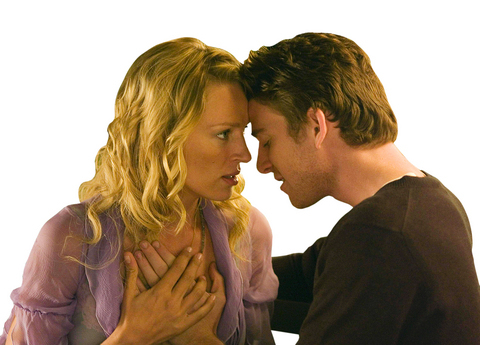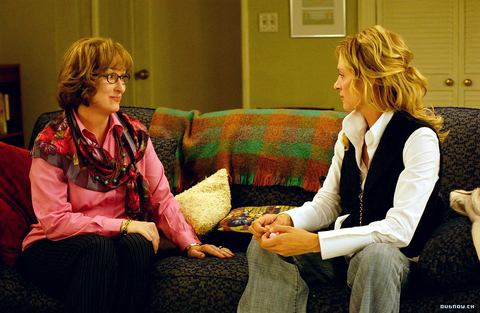In Prime, a surprisingly smart romantic comedy, Uma Thurman plays Rafi Gardet, a stunning New Yorker who's going through a divorce. After a week of being legally single, she starts seeing David Bloomberg (Bryan Greenberg), a lanky and handsome artist who's insecure about his paintings. He calls her up and asks her out after they meet one night. She's reluctant to keep dating him: he's 23; she's 37 (the prime numbers to which the movie presumably refers). To her, the age difference "smells of pool boy" at a resort.
That's what Rafi tells her therapist, the wise and insightful Lisa Metzger (Meryl Streep). Lisa is also friendly, encouraging, and motherly. For 23 years that maternal energy has been aimed at David, who is her son.
When Lisa finds this out, she is supposed to self-destruct with shock. She wants her son to marry a Jew -- his own age. But the movie doesn't go for farce and tries instead to treat this snag as a real problem, one that David and Rafi become aware of long after Lisa does.

PHOTOS COURTESY OF FOX MOVIES
Too many American movies about families feel like sitcoms, but in Prime, writer-director Ben Younger creates a scenario with real-life consequences for his characters. Not major consequences, but little shifts that provide occasions for growth. As Hollywood movies go, this is unexpected and cosmopolitan, like finding a Euro in your box of Cracker Jack.
Younger's first movie, 2000's Boiler Room, prepared me to dislike this second one. Boiler Room was a cocky stew of new-jack cinema -- Oliver Stone's Wall Street meets a make-my-daddy-proud melodrama -- set in the world of do-it-yourself brokerage firms.
The director of that movie had a chip on his shoulder. He needed to grow up. With Prime, he has.

The movie could have been a string of grotesque insults, like last spring's Monster-in-Law. Once Lisa connects the dots between her patient's new love and her son's, Streep mines the physical comedy, but doesn't become a harridan. She knocks around her office until she makes a dramatic collapse in a chair. Her grief and exasperation feel just right.
Disgusted as Lisa is, she continues to treat Rafi. Her patient's happiness comes before her own, so, outrageously, she endures Rafi's ecstatic descriptions of sex with her son. Lisa also has to sit through Rafi's frustration with the lack of structure in David's life. He doesn't know what to do with himself, she complains. He lives with his grandparents and his family doesn't seem to take his painting seriously, so he doesn't. (They should: They're vivid, urban oil portraits by Tim Okamura.)
Rafi complements David's
aimlessness. She's a well-connected photo shoot producer. She introduces him to John Coltrane's music and an art dealer who likes David's work. And No. 203 is their favorite Mark Rothko painting.
Yes, Younger has made an update of the "shiksa who changed my life" story in Annie Hall. But Prime is missing the psychological acuity and scabrous cultural wit of Woody Allen at his best. These lovers meet standing in line to see Antonioni's Blow-Up and never mention the movie.
Instead, Prime has an of-the-moment rhythm that feels authentically, youthfully downtown. David and his best friend, Morris (Jon Abrahams), a preppy hip-hop Jew, wear trendy T-shirts with slogans such as "Palestinians do it better." (Morris also happens to be a jolly misogynist who lives in a dump and throws pies in women's faces. But never mind: They're from Magnolia Bakery, the hipster's pastry shop of choice.) There's also a sexy sequence in which David takes Rafi to a multiracial house party full of people who actually seem to be dancing to the classic Junior Mafia song on the soundtrack.
The great tensions in Prime are not romantic but lifestyle-driven. The keepin'-it-realism of Lisa's parental and religious wishes is incompatible with David's open-minded, post-collegiate drift, which is at odds with Rafi's very adulthood. Lisa, Rafi, David, and even nasty little Morris have to ask whether how we live determines who we love and who loves us.

May 26 to June 1 When the Qing Dynasty first took control over many parts of Taiwan in 1684, it roughly continued the Kingdom of Tungning’s administrative borders (see below), setting up one prefecture and three counties. The actual area of control covered today’s Chiayi, Tainan and Kaohsiung. The administrative center was in Taiwan Prefecture, in today’s Tainan. But as Han settlement expanded and due to rebellions and other international incidents, the administrative units became more complex. By the time Taiwan became a province of the Qing in 1887, there were three prefectures, eleven counties, three subprefectures and one directly-administered prefecture, with

Taiwan Power Co (Taipower, 台電) and the New Taipei City Government in May last year agreed to allow the activation of a spent fuel storage facility for the Jinshan Nuclear Power Plant in Shihmen District (石門). The deal ended eleven years of legal wrangling. According to the Taipower announcement, the city government engaged in repeated delays, failing to approve water and soil conservation plans. Taipower said at the time that plans for another dry storage facility for the Guosheng Nuclear Power Plant in New Taipei City’s Wanli District (萬里) remained stuck in legal limbo. Later that year an agreement was reached

What does the Taiwan People’s Party (TPP) in the Huang Kuo-chang (黃國昌) era stand for? What sets it apart from their allies, the Chinese Nationalist Party (KMT)? With some shifts in tone and emphasis, the KMT’s stances have not changed significantly since the late 2000s and the era of former president Ma Ying-jeou (馬英九). The Democratic Progressive Party’s (DPP) current platform formed in the mid-2010s under the guidance of Tsai Ing-wen (蔡英文), and current President William Lai (賴清德) campaigned on continuity. Though their ideological stances may be a bit stale, they have the advantage of being broadly understood by the voters.

In a high-rise office building in Taipei’s government district, the primary agency for maintaining links to Thailand’s 108 Yunnan villages — which are home to a population of around 200,000 descendants of the Chinese Nationalist Party (KMT) armies stranded in Thailand following the Chinese Civil War — is the Overseas Community Affairs Council (OCAC). Established in China in 1926, the OCAC was born of a mandate to support Chinese education, culture and economic development in far flung Chinese diaspora communities, which, especially in southeast Asia, had underwritten the military insurgencies against the Qing Dynasty that led to the founding of